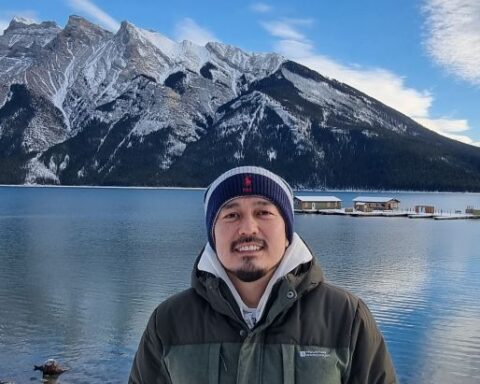It’s been more than a month since Canadian news media reported that a 22-year-old Calgarian was killed in Syria. Damian Clairmont – a Muslim convert – was believed to have died in combat, after joining an extremist group with alleged links to Al-Qaeda.
It’s news his mother, Chris Boudreau, is struggling to grapple with even today, as she shares her side of the story in a Calgary coffee shop.
“We have no closure,” says Boudreau. “We have no body. We have no death certificate.”
She doesn’t recognize the Damian Clairmont described in the newspapers. She can barely believe it’s the same young man she raised.
Home-bound lad
Smiling through her tears as she traces memories of a bright, athletic teen — someone who never quite fit in anywhere and was “always the underdog in school, standing up for kids who were bullied.” Clairmont was raised in an Acadian Catholic household and once aspired to have a career in the culinary arts – making pasta sauces from scratch was his specialty – and he even had the chance to apprentice for a chef in France, only to turn it down so he could stay close to home.
But all that changed after his 17th birthday, when a bout of depression riddled with anxiety disorders, led him to try to take his own life. The botched suicide attempt served as a wake-up call and Clairmont turned to religion for solace, converting to Islam and wanting to become a spiritual leader.
“In the beginning, he finally appeared to have found peace and I wasn’t worried about him trying to commit suicide,” says his mother. “He seemed like he found somewhere he could fit, where he could gravitate towards.”
Complete makeover
Clairmont told his mother he wanted to study Arabic in Egypt, and left Canada in November 2012 to do so. What she didn’t know was that he was actually headed to Syria to join a rebel group called Jabhat al-Nusra. To add insult to injury, Boudreau says she learned he changed his name to Mustafa Al-Gharib, shedding himself of any lingering vestiges of his former Canadian self.
“When he converted, I don’t know where he learned everything from,” she says. “I don’t know what he thought was right and what he thought he was supposed to be doing as a person.”
After he left, Boudreau says the Canadian Security Intelligence Service (CSIS) approached her, as his activities in Calgary had red-flagged authorities. She says CSIS already knew of Damian’s checkered past and his medical history – he was on prescription medication and he frequently saw a psychiatrist up until the time he left the country.
Who coached him?
Nevertheless, what bothered her more was that Damian had been on CSIS’ watch-list prior to leaving for Syria, but was still issued a Canadian passport two months before his flight. She claims the organization was keeping tabs on a specific group in Calgary that they speculated was recruiting members to fight in Syria.
With no immediate closure in sight, questions continue to haunt her: Who taught her son he needed to fight to be considered a true Muslim? How did this happen on Canadian soil? Why didn’t anyone do anything to stop it?
“I think what hurts me the most is that I didn’t know in advance,” her voice cracking as she dabs her left eye with a Starbuck’s napkin. “I didn’t even try to stop it. So I’ve got to carry that guilt for the rest of my life.”
One Calgary imam insists there wasn’t much she could do. Syed Soharwardy is the founder of the Islamic Supreme Council of Canada (ISCC) and founder of Muslims Against Terrorism (MAT). He says he’s convinced Clairmont was “brainwashed” by someone in Calgary.
“There’s no doubt that people in Calgary, in Canada, who brainwash Muslim youth and speak out against the West,” he says. “They live in the West, but they have something in their mind that creates hate toward America, Canada, Christians, Jews.”
Not an isolated case
Soharwardy says Clairmont’s story is not a rare case – it’s been an ongoing problem in Canada for years, with the most notable example being the Toronto 18 terror cell, when 18 people were arrested for plotting a series of terrorist attacks in Southern Ontario in 2006.
He says conditioning people to adopt fanatic ideologies can take months – and it can be hard to catch the masterminds behind it.
“Those [who brainwash] would never stand up in mosque,” says Soharwardy. “They sit down with youth, read them teachings, and then they get closer, into their inner circle.”
Eventually, he says, “They plant a seed into young, impressionable minds that they must go to war-torn countries such as Syria to fight and prove their allegiance.” He says the federal government isn’t doing enough to stop it from occurring.
“They wait for disasters to happen and then act,” says Soharwardy. “The Canadian government is also responsible. They should stop letting fanatic ideologies from spreading under the patronage of establishment of Canada. It’s killing Muslims and destroying world peace.”
He’s not alone with that sentiment. Social worker Wendy Mitchell agrees. Mitchell refers to herself as a “cultural liaison” for the Muslim community and wonders if “reverts” – or people who converted “back” to Islam – make ideal targets because they’re more vulnerable.
“Most reverts do not have the same support group as their families, that this boy did,” says Mitchell. “So they’re out there all by themselves, seeking, and all of a sudden everybody tells them you should do this, and they don’t know any better. They think they’re true followers and that Jihad is something they should do because they want to prove themselves.”
Perceived gaps like these are what Soharwardy is trying to combat. He’s travelling across the country to raise awareness about extremism, and openly condemns Al-Qaeda. For more than a decade, he’s been organizing a rehabilitation program for youth suspected of being ensnared in radical agendas. He says over the years, he’s spoken with hundreds of youth in schools, even going so far as to organize nature retreats as a sort of spiritual detox to get through to wayward youth.
Soharwardy admits he never met Damian Clairmont, but wishes he had, thinking the outcome may have been different.
Mother’s anguish
For Damian Clairmont’s mother, losing a child was just the beginning. It’s left deep wounds – emotional stress, financial burden as a result of not being able to work, and fear for her family’s safety.
Chris Boudreau says she’s written to the federal government wanting to know more about her son’s death, but her requests have been ignored. With no one to hold accountable, she says she feels helpless but refuses to believe she’s alone. She’s convinced there are other families facing the same dilemma, with children who have been recruited to fight in wars that aren’t their own, while their next of kin remain in the dark until it’s too late.
CSIS won’t introduce Boudreau to these families, but she’s hoping that if she can find them herself, she can begin to piece together the few fragments she has of her son’s final days, and find some sort of closure.
“There are so many things that I don’t understand that are still up in the air,” she says. “Maybe we can compare notes and grieve with one another and have something common ground, but I have nobody to do that with [now].”
Still, Boudreau realizes she needs to move on. An incongruous task since she has yet to put the past behind her: no body, no funeral.
She wants to hold a memorial service for her son on his birthday; he would have turned 23 in May. She insists it would have to be non-denominational – with no ties to the Catholic faith he shunned or the Islamic faith that she says has yet to embrace him as a true member of the community. She quickly adds that she respects Muslims and their beliefs – she simply doesn’t understand the traditions. But she wants to.
She’s hoping a memorial will at the very least give her something to hang onto – as she waits for an absolution that may never come.




